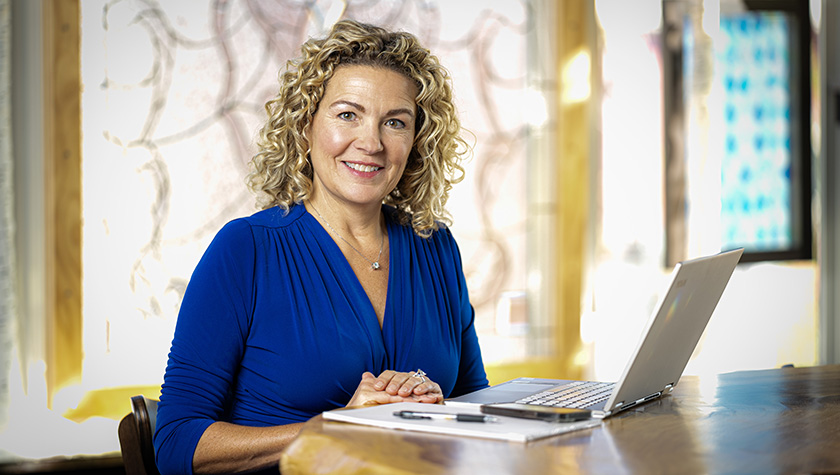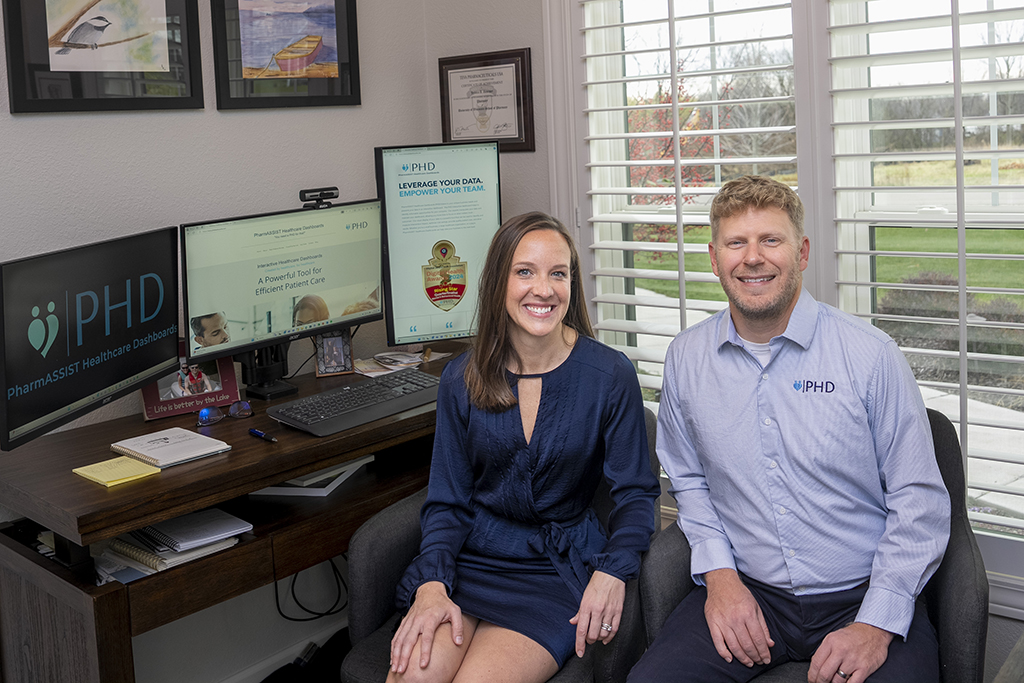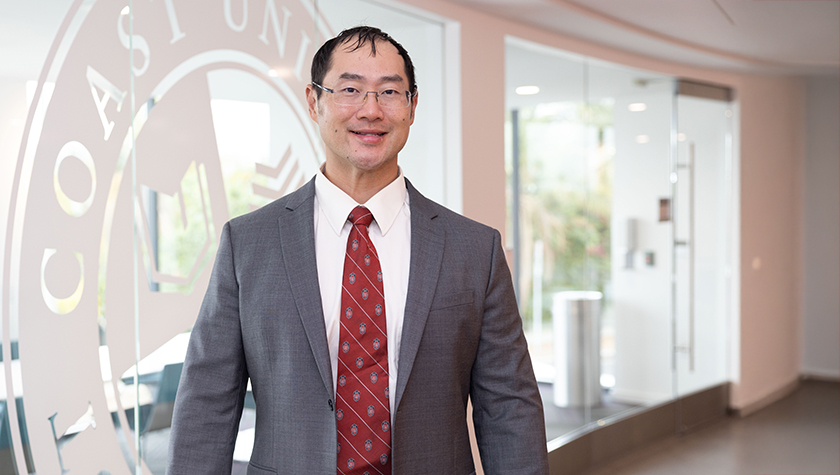
Alumna Lani Bertrand aims to use automation and technology to strengthen the pharmacist-patient connection
By Archer Parquette
Imagine a fully autonomous hospital pharmacy. Medication management is handled by sophisticated machines that dispense prescriptions with calibrated accuracy. Smart devices keep careful track of inventory, with centralized databases that ensure patients are receiving their proper medications on time. There’s next to no dosage errors or waste, no human touches on the medication until it’s brought to each patient, and complete regulatory compliance. Pharmacists spend less time filling and verifying prescriptions and more time with their patients.
Lani Bertrand (BS ’97) is one of the pharmacists working to bring that vision to life.
After graduating from the University of Wisconsin–Madison School of Pharmacy, Bertrand took a winding and unconventional path through the healthcare industry.
“I take a lot of pride in the fact that I attended pharmacy school at the University of Wisconsin,” says Bertrand. “There’s a pedigree. It’s a special feeling to say, ‘I’m a Badger.’”
She spent time in smaller healthcare startups, practiced pharmacy with Aurora Health Care, worked in sales for a few years at a technology and automation company called Swisslog, was a senior director for a biosciences company, and more, before being recruited by Omnicell in 2020.
“I love working with the early adopters, the pioneers who embrace technology. You’re at the leading edge, where you can really make an impact.”
—Lani Bertrand
Omnicell, founded in 1992, is a Fort Worth, Texas-based pharmacy automation company that develops robotics, software, automated dispensing technology, and other solutions that can take on rote tasks like filling and managing medication. The company, which has primarily served health system pharmacy, tapped Bertrand for a role in solution design consulting leadership, and then transitioned to become the senior director of clinical marketing and thought leadership in 2023.
“Omnicell was looking to grow and continue to innovate, and they had a good reputation in the automation and technology space,” says Bertrand, who works remotely from Wisconsin. “This was an opportunity for me to bring my past experiences and knowledge to the table and to really make an impact.”
Omnicell is one of several companies working in the growing field of pharmacy automation, such as Parata Systems, BD, McKesson, or iA. Right now, Omnicell provides pharmacies with automated medication management devices and tools, but its — and Bertrand’s — ultimate vision is to make that completely automated pharmacy possible.
Mitigating error through automation
The U.S. Food and Drug Administration receives over 100,000 reports of medication errors each year, such as a patient receiving the wrong drug, taking the incorrect dose, or being medicated at the wrong time. Pharmacy automation ultimately aims to reduce that number to statistical zero by turning the rote tasks of prescription-filling and inventory over to robotics and smart devices, overseen by humans, that fill and log every step of the dispensing process.
“Our goal is truly zero errors, zero drug waste, 100% accuracy, 100% compliance,” Bertrand says. “That’s an easy goal for me to get behind. I love working with the early adopters, the pioneers who embrace technology. You’re at the leading edge, where you can really make an impact.”
Omnicell’s advanced robotic technology, optimization software, and onsite and remote experts help automate the most cumbersome operational aspects of the medication dispensing process. They aim to reduce medication dispensing errors and waste, improve accuracy, streamline workflows, and allow pharmacy labor resources to concentrate on higher value tasks.

While Bertrand’s role is in marketing and thought leadership, she applies her years of experience as a pharmacist to the newly developing technology and its potential uses.
“I spent several years in ambulatory pharmacy practice, working in a very busy clinic,” she says. “I understand the impact automation can have on a pharmacy and a health system. And I know what it’s like for health care workers, so I can envision how they can embrace this technology instead of having to work around it.”
Bertrand says that Omnicell is defining and delivering the outcomes-centric innovation that is transforming medication management across all settings of care.
“We’re helping healthcare facilities worldwide to make the industry-defined vision of the autonomous pharmacy a global reality. We want to reallocate pharmacy and nursing staff members’ time to more meaningful clinical tasks,” says Bertrand. “That means getting clinicians closer to the patient bedside.”
With dispensing tasks off their plate, hospital pharmacists could spend more time monitoring patients’ lab results and adjusting medications as necessary, educating patients, consulting with physicians, leading antimicrobial stewardship initiatives, and other ways to improve patient outcomes.
“At the end of the day, what’s most important is getting the pharmacist focused on patient care,” she says. “Are they getting the right drug? The right dosage? The full attention of their pharmacist?”
Automation can cut down on costs and increase efficiency, but Bertrand also emphasizes the benefit to patient safety she believes autonomous pharmacy offers.
“To quote an expression, ‘To err is human,’” says Bertrand. “When you remove human touches from a process, you reduce the risk of error.”
A burgeoning field
Bertrand envisions a future for pharmacy in which medication has “zero human touches,” with pharmacists using their expertise instead at patient bedsides and in direct patient care and education roles.
Adoption of pharma automation tech remains in its early stages, but a growing number of hospital systems are implementing it. According to a 2024 national survey from Pharmacy Purchasing & Products, 51% of hospital systems pharmacy directors have adopted pharmacy carousel or robot automations this year, up from 33% in 2014.
“At the end of the day, what’s most important is getting the pharmacist focused on patient care.”
—Lani Bertrand
Bertrand says that artificial intelligence and machine learning is a rapidly growing technological development that could be used in future pharmacy automation tools. As the field grows, Bertrand sees more expansion outside of the hospital, into outpatient pharmacies, and even patients’ homes.
“As patients are taking care into their own homes, we’re looking at ways to support those patients and make that at-home care part of the autonomous pharmacy journey,” Bertrand says. “Innovation is always a priority.”
In the end, she hopes to reach the goal that inspires her work in automation – “zero errors, zero drug waste, zero human touches, 100% data and inventory visibility, and 100% pharmacist time spent on clinical activities.”

